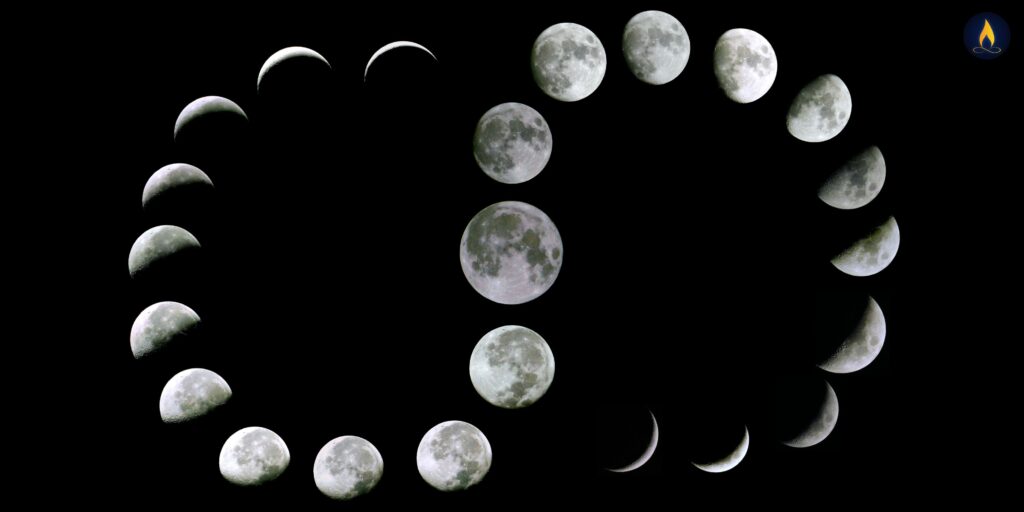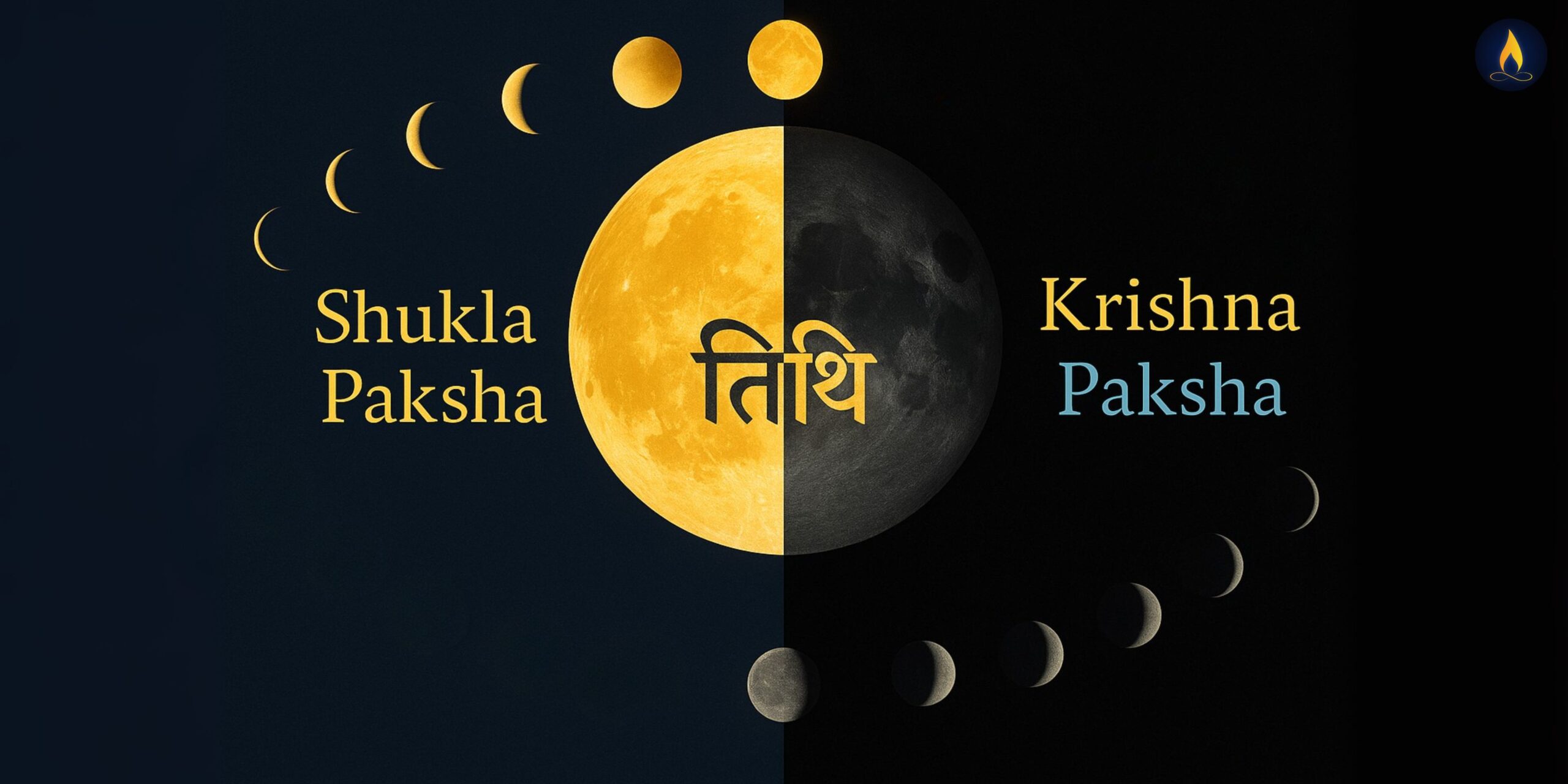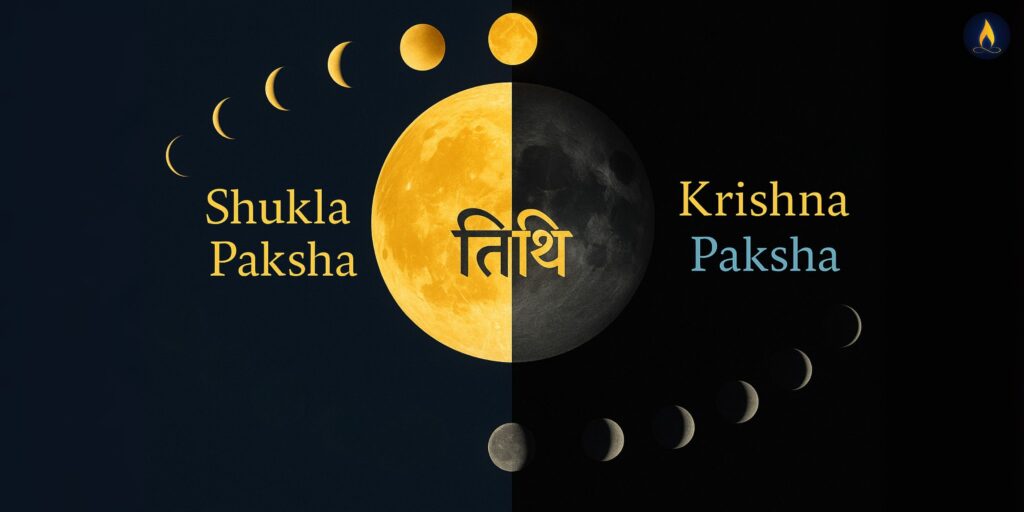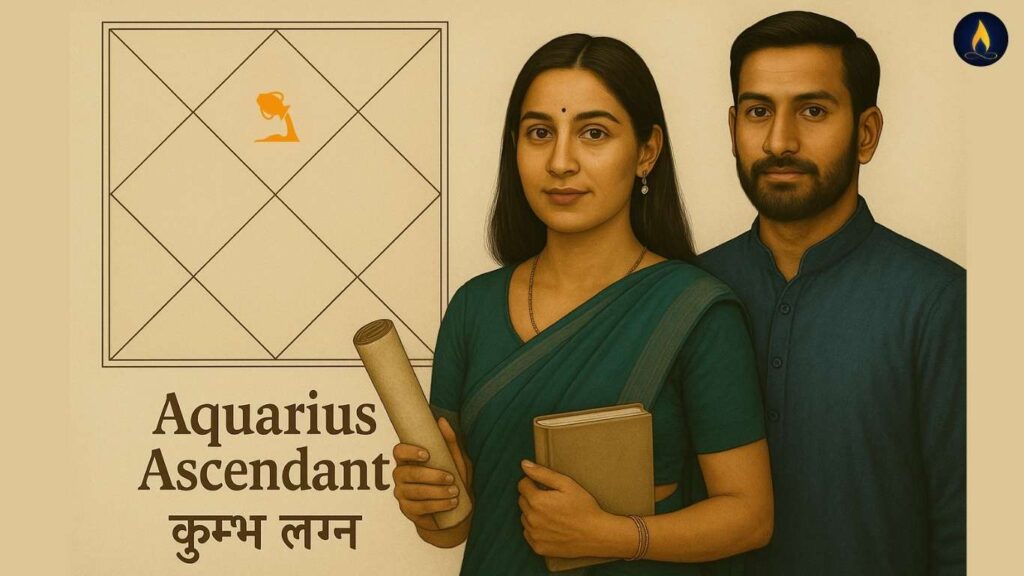Blog Contents
ToggleWhat if each day carried a unique spiritual rhythm? In the world of Vedic astrology, it does. This rhythm is governed by Tithis—the lunar days that define auspicious timings, festivals, inner moods, and karmic imprints.
Tithis are the heartbeat of the Hindu lunar calendar and one of the most essential elements in Panchang. Every ritual, festival, and Muhurta (auspicious timing) in Vedic astrology is deeply connected to the Tithi. Knowing your birth Tithi or understanding today’s Tithi gives profound insight into your emotional and spiritual nature.
Let’s understand the basics of Tithis and how they shape Vedic timekeeping, karma, and personality traits.
Shukla Paksha and Krishna Paksha – The Two Lunar Fortnights
Before diving into individual Tithis, it’s important to grasp the two major phases of the Moon in a Hindu month. These two halves—Shukla Paksha and Krishna Paksha—set the tone for the energies that flow through each Tithi.
- Shukla Paksha: The waxing phase of the Moon, starting from Amavasya and ending at Purnima. Each night, the Moon grows brighter.
- Krishna Paksha: The waning phase of the Moon, beginning from Purnima and ending at Amavasya. The Moon gets darker each night.
“Paksha” means side or fortnight. “Shukla” means bright and pure, while “Krishna” refers to darkness. These phases influence not just light in the sky but the energies on Earth and within us.
Complete List of 15 Tithis in Each Paksha
Each Tithi is not just a date—it holds a specific mood and energy. These 15 lunar days repeat twice in a month (once in each Paksha), and each has a special role in astrology and rituals.
- Pratipada – New beginnings, starting energy
- Dwitiya – Duality, partnership
- Tritiya – Growth, expansion
- Chaturthi – Obstacles, breakthroughs
- Panchami – Learning, curiosity
- Shashthi – Protection, health
- Saptami – Power, courage
- Ashtami – Intensity, transformation
- Navami – Purpose, Dharma
- Dashami – Success, leadership
- Ekadashi – Fasting, purification
- Dwadashi – Restoration, healing
- Trayodashi – Letting go, relief
- Chaturdashi – Completion, transition
- Purnima / Amavasya – Fullness or emptiness, spiritual culmination
These Tithis are the foundation of Hindu festivals like Ekadashi, Navratri, Maha Shivratri, and many more.
Classification of Tithis into Five Yogic Categories
Beyond just names and dates, the 15 Tithis are further grouped into five powerful classifications based on their elemental and energetic nature. These groupings help in choosing the right Tithi for spiritual or material tasks:
- Nanda Tithi – Ruled by Fire (1st, 6th, 11th): Auspicious for joyful beginnings and celebrations
- Bhadra Tithi – Ruled by Earth (2nd, 7th, 12th): Ideal for laying strong foundations and practical tasks
- Jaya Tithi – Ruled by Akash (3rd, 8th, 13th): Excellent for overcoming obstacles and competitive activities
- Rikta Tithi – Ruled by Water (4th, 9th, 14th): Considered inauspicious for new ventures, better for letting go
- Purna Tithi – Ruled by Air (5th, 10th, 15th): Favorable for completion, spiritual rituals, and fulfillment
This classification adds another astrological layer when choosing Muhurtas or understanding personality traits based on birth Tithi.
Tithis from the Lunar Point of View

From an astronomical and astrological perspective, the strength of the Moon varies with each Tithi. This affects our mental clarity, emotional state, and spiritual practices.
- In Shukla Paksha, the Moon is gradually gaining strength. But from Pratipada to Panchami, it’s still weak.
- In Krishna Paksha, the Moon starts very strong after Purnima, but from Pratipada to Panchami, it is considered most vibrant.
These energetic shifts influence not only festivals and fasts but also the timing of key life events.
Tithi-Wise Personality Traits in Astrology
Your birth Tithi says a lot about your nature, mindset, and even karmic tendencies. Vedic astrology gives special emphasis to whether one is born during Shukla or Krishna Paksha.
Born During Shukla Paksha
- Bright, ambitious, outward-focused
- Favors new beginnings, creativity, and karma-building
- Night birth during Shukla Paksha is considered highly auspicious
Born During Krishna Paksha
- Wise, introspective, inward-focused
- Deeply spiritual and karmic in nature
- Day birth during Krishna Paksha is more favorable and stabilizing
Astrologers often check the Tithi in a person’s Janma Kundali (birth chart) to understand their emotional flow and karmic patterns.
Role of Tithis in Vedic Astrology
Tithis are not just part of the calendar—they are an astrological indicator of how time itself flows energetically. Here’s how they play a deeper role:
- Tithis affect your emotional nature, mental energy, and even destiny path.
- Many yogas (planetary combinations) form only on specific Tithis.
- Matching Tithis is important in Kundali Milan (matchmaking).
- Some Tithis can cause Tithi Dosha if birth occurs during negative combinations – remedies include fasting or special pujas.
- Muhurtas are chosen based on Tithi suitability for the event (e.g., marriage, business, travel).
Understanding the Tithi gives insight into your karma cycle and helps pick the right moments to act.
Festivals Based on Tithis
Every major Hindu festival is aligned with a specific Tithi, not a date. This is why Diwali, Navratri, or Maha Shivratri fall on different solar calendar dates each year.
- Ekadashi (11th Tithi): Ideal for fasting and purification
- Purnima: Full Moon energy, good for rituals and spiritual practices
- Amavasya: New Moon, powerful for ancestor rituals (Pitru Karma)
- Chaturthi: Lord Ganesha’s day
- Navami and Dashami: Important in Durga Puja and Dashain (Dussehra)
These days are filled with heightened cosmic energy, making them powerful for spiritual progress.
Tithis are not just moon phases – they are divine timekeepers shaping our karma, thoughts, and destiny. Whether you’re checking your Panchang or decoding your Kundali, knowing the Tithi unlocks deeper understanding of your spiritual path.
FAQs
Q1. What is today’s Tithi?
Check daily Panchang on trusted Vedic sites or our app for live Tithi updates.
Q2. How is Tithi different from the date?
Tithi is based on the Moon’s position, while the date is a solar calendar system.
Q3. How can I find my birth Tithi?
Use a reliable Janma Kundali calculator or consult an astrologer.
Q4. Is Tithi more important than Nakshatra?
Both are crucial. Tithi represents emotional rhythm; Nakshatra shows life patterns.
Q5. Can a Tithi affect mood or success?
Yes. Tithis govern emotional tides. Right Tithi timing can boost outcomes in work, relationships, and spiritual efforts.
To know your personal Tithi and what it means for your life, you can book a 1-on-1 astrology session with our experts: click here: [Vedic-astrology-consultation/astroparasar].









